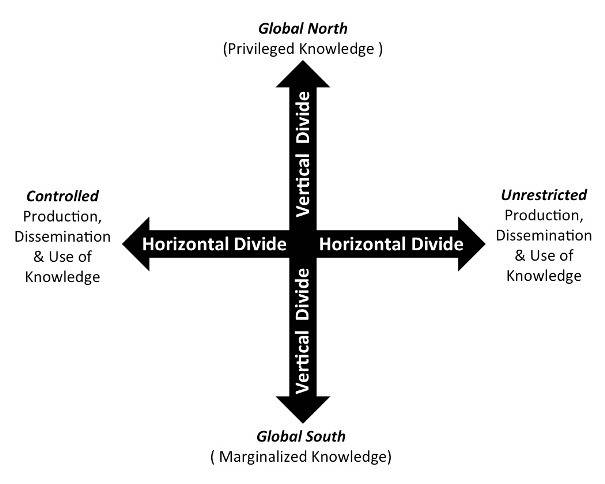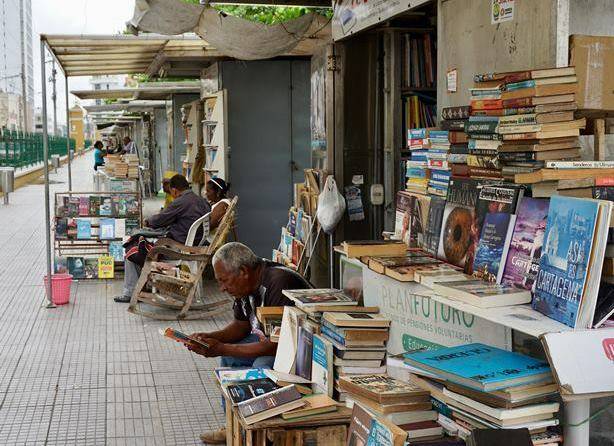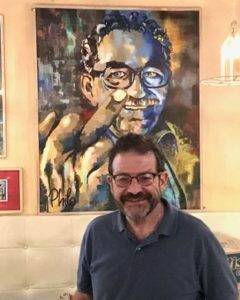Reflections on the 2017 Cartagena Assembly for Knowledge Democracy: Part 1
In preparing to write this essay I reread the article that appeared in Educational Action Research by Janel Seeley, Mary McAteer, César Osorio Sánchez, and Yuliana Kenfield, (2019) that examined the impact of the Global Assembly for Knowledge Democracy. In it, they note that there was a miscommunication in the advertising for the Assembly, which resulted in attendees to the Action Research Network of Americas (ARNA) conference not being aware of it ahead of time. I must admit that I suffered from that confusion, and as a result, I wasn’t prepared for the Assembly, and hadn’t thought much about being immersed in a global event focusing on knowledge democracy. Even so, the Assembly was both eye-opening and an intense learning experience for me. In that day I found myself as a “legitimate peripheral participant” (Lave & Wenger, 1991), rapidly learning more about what knowledge democracy means in a global perspective. I was able to come away with a consensus definition of knowledge democracy, including the idea of dialogo de sabreres (the ecology of local knowledge) that has been developed in Latin America. In fact, having the opportunity to interact with colleagues across the Americas was a major factor in my learning of both the theoretical aspects of knowledge democracy, and also about the values, moral purposes, and politics that are integral to it.
The major effect on me of participating in the Global Assembly was that It led me to delve deeper into the whole notion of knowledge democracy, which I had been aware of, but only peripherally. I had done some research on how the differences between placements in the Global North and Global South affected the development of global competency among engineering and science graduate students (Vernaza-Hernández & Feldman, 2015). I was also aware of issues related to indigenous knowledge because one of my doctoral students looked at traditional education in Zimbabwe in comparison to education in the North (Matsika, 2000).
Returning Home from Cartagena
Coming back to Tampa after Cartagena , Fred Bradley, who at that time was my doctoral student and attended the 2017 ARNA conference, and I began to explore what knowledge democracy means to us in our educational situation in the Global North. We did this through a process that began as a critical autoethnography (Acosta et al., 2015), and evolved into a co-autoethnography. It began as an exploration of my life in action research in relation to knowledge democracy (Feldman & Bradley, 2019). We asked, “How has Allan’s life in AR contributed to KD [knowledge democracy]?” and “What actions could he take to increase this contribution?” The second question resonates with the goal of the Global Assembly that its attendees go beyond talking and thinking about KD to taking actions to increase and promote it. The study was done through collaborative conversations in which Fred served as my critical friend, self-reflective writing by both of us, and interrogation of my previous writings about action research. It soon became clear to us that as our conversations progressed, we shared, discussed, and talked about our understandings of the nature of KD in light of our individual knowledge and experiences in teacher education. This led us to think of the study as a critical co-autoethnography. Of course this evolution of our methodology was in itself a move toward knowledge democracy. As originally conceived, there was the implicit hierarchy in action that put me, the professor, over Fred, the graduate student. By shifting to a co-autoethnography, it made the study more democratic.
As Fred and I read the literature on KD and discussed it, we sought ways to use it to understand the educational and power disparities in our region for both students and teachers. It quickly became clear to us that we could use the framework that had been developed to understand the issues of power and knowledge between the Global North and Global South for our research about the great inequities in our region. Those disenfranchised and marginalized in our schools, which includes people of color, those whose first language is not English, immigrants, people living in poverty, and refugees, could be conceptualized as the Global South, while those in power, including us in the university, are the equivalent of the Global North. For example, when university researchers work with teachers, they, and this includes us, often use academic language. While some teachers have access to this, its use can exacerbate the power differentials and silence teachers. If we instead use the language that teachers have developed to talk about their work, it becomes a more democratic relationship, including situating us as learners along with the teachers (Seidel Horn & Kane, 2019). The same happens when we impose university-style research on teachers as they engage in action research. Instead, we can work to make our relationships with practitioners more democratic by using action research methods that can be embedded in their practice (see Feldman & Alsultan [2022], for an example).
The de-professionalization of Teachers
The concept of knowledge democracy also helps to uncover the ways in which those in power in educational systems de-professionalize teachers. What we’ve been seeing more and more in our state (Florida) is the ways in which language is twisted to control what teachers can say and do in the classroom. Recent examples are the “Don’t Say Gay” bill (Phillips, 2022), and the barring of the use of mathematics textbooks that use real world examples related to race, ethnicity, or gender (Balingit, 2022). Another example is the rhetoric by those in power require teachers to use only evidence-based practices. Typically what this means is teaching methods that have been demonstrated to “work” by university researchers using “scientific” methods. This delegitimates teachers’ knowledge in the same way that knowledge from the Global North delegitimates local knowledge (see Hammersley [2007] for more about this).
In rereading the article by Janel, Mary, César, and Yuliana (2019), I was struck by one of the definitions provided by Assembly participants from Sweden:
It (knowledge democracy) means open access to the sharing of knowledge for all citizens, . . . and communities of living inquiry to improve human condition. Mutual respect as well for the capacity of not only professional scientists but also citizens in general to understand and use basic norms and practices of science understood in a broad sense. It calls for democratic dialogue as core medium for sharing and developing knowledge where different knowledge claims is treated fairly and equally (Sweden). (p. 30)
In the article that Fred and I wrote for the special issue of Educational Action Research on KD, we put forth the idea that KD could be thought of as being along two divides. The divide that the Assembly focused on was what we labeled as the vertical divide between the Global North with its privileged knowledge and the Global South with its knowledge marginalize by the North. We developed the idea of the horizontal divide (see figure 1) based on our reading of a collection of papers that were presented at a conference in the Netherlands (in’t Veld, 2010). This divide is between the controlled, on one side, and unrestricted, on the other side, production, dissemination and use of knowledge. The unrestricted side envisions the free access to knowledge for all, and what I believe the definition above from Sweden is suggesting. In academia we are seeing this happening with the promotion of the idea of open access publication. Unfortunately, many of the open access journal charge high fees for this. Using the Taylor & Francis website (https://authorservices.taylorandfrancis.com/publishing-open-access/open-access-cost-finder/?category=Education&journal=reac&fulloa=1&openselect=1¬available=1&dove=1&routledge=1&tandf=1&numberofresultsperpage=5&pagenumber=1), I found that for me, who is in the US, to publish open access in Educational Action Research would cost over $3000. Of course the Social Publishers Foundation (SPF) website (https://www.socialpublishersfoundation.org/), which is where this essay is appearing, does not charge fees. However, as universities push more and more for publication in “high impact” journals for tenure and promotion, the cost for open access journals is often prohibitive for junior faculty members.
Knowledge Democracy: A hopeless Utopia?
But the idea of unrestrictive knowledge production, dissemination, and use goes far beyond knowledge produced in the academy. If one is not concerned with the status of publishing in a high impact journal, the Internet provides countless cost-free opportunities to get one’s thoughts out there. While this should be democratizing, we have seen the flip side of this as Facebook, Twitter, and other platforms are used to distribute false, misleading, and dangerous information. This was predicted by Turnhout (2010), who called the horizontal conception of KD a ”utopian ideal” because it requires “networks of connected, free and equal actors’ (pp. 31–32). Since these types of networks are few and far between, she saw unrestricted KD as having undesirable technocratic and anti-democratic implications.
Conclusion
In reflecting on what I’ve written here, I realize that I have to thank Lonnie for inviting me to write a piece on how my participation in the Global Assembly affected me. It is difficult to believe that five years have gone by from the time when we were all in Cartagena together. The Assembly was an incredible educational, political, and uplifting event, but the events that we have all experienced since 2017 have confronted us with major challenges we face on the road ahead. Those of us in the US lived under an antidemocratic regime from 2017-2021 that has spread hate and fear through the population. The same has been the situation in other countries around the world. We are all continuing to deal with the pandemic that has killed millions of people, disrupted so many lives, and has had a strong negative effect on children’s education, especially for those living in poverty.
In Janel, Mary, César, and Yuliana (2019)’s article they noted how we all appreciated the opportunities amongst us for shared conversation and learning from one another. But probably most important was that we left with the commitment to promote the socially and epistemologically just action of knowledge democracy in our home institutions and communities. I believe that this tremendous amount of positive energy we gained from the Global Assembly helped me to navigate the difficulties of these past five years.
I end by noting that as I write this in May 2022, I realize that it may no longer be possible to separate the horizontal and vertical divides of knowledge democracy. Because of the nearly ubiquitous presence of the Internet and its access via smart phones in both Global North and Global South, knowledge, or what is presented as knowledge, is freely disseminated to anyone who has access to the web. It is not at all clear to me what this means in terms of the vertical divide because it possibly makes fuzzy what is privileged and what is marginalized knowledge. However, what still remains, and I think grows stronger every day, is the inequities between the ways that those in power use their resources to disseminate knowledge and those whom they marginalize, disenfranchise, and oppress.
Figure 1
Horizontal and Vertical Conceptions of Knowledge Democracy (Feldman & Bradley, 2019, p. 93)

References
Acosta, S., Goltz, H. H., & Goodson, P. (2015). Autoethnography in action research for health education practitioners. Action Research, 13(4), 411-431.
Balingit, M. (2022). DeSantis accused textbooks of ‘indoctrination.’ Here’s what he meant. The Washington Post. https://www.washingtonpost.com/education/2022/05/09/florida-banned-textbooks-math-desantis/
Feldman, A., & Alsultan, J. (2022). Self-Study of Dialogic Collaborative Educational Action Research in an Online Environment. SAGE Publications. https://doi.org/10.4135/9781529600520
Feldman, A., & Bradley, F. (2019). Interrogating ourselves to promote the democratic production, distribution, and use of knowledge through action research. Educational action research, 27(1), 91-107. https://doi.org/10.1080/09650792.2018.1526097
Hammersley, M. (2007). Educational research and evidence-based practice. Open University Press and Sage Publications.
in’t Veld, R. J. (Ed.). (2010). Knowledge Democracy: Consequences for Science, Politics, and Media. Springer.
Lave, J., & Wenger, E. (1991). Situated learning: Legitimate peripheral participation. Cambridge University Press.
Matsika, C. (2000). Traditional African Education: Its Significance to Current Educational Practices with Special Reference to Zimbabwe [Dissertation, University of Massachusetts]. Amherst, MA.
Phillips, A. (2022). Florida’s law limiting LGBTQ discussion in schools, explained. The Washington Post. https://www.washingtonpost.com/politics/2022/04/01/what-is-florida-dont-say-gay-bill/
Seeley, J., McAteer, M., Osorio Sánchez, C., & Kenfield, Y. (2019). Creating a space for global dialogue on knowledge democracy: experiences from the inaugural global assembly for knowledge democracy. Educational action research, 27(1), 22-39. https://doi.org/10.1080/09650792.2018.1552170
Seidel Horn, I., & Kane, B. D. (2019). What we mean when we talk about teaching: The limits of professional language and possibilities for professionalizing discourse in teachers’ conversations. Teachers College Record, 121(6), 1-32. https://www.tcrecord.org ID Number: 22735.
Turnhout, E. (2010). Heads in the clouds: knowledge democracy as a Utopian dream. In R. J. in ’t Veld (Ed.), Knowledge Democracy: Consequences for Science, Politics, and Media (pp. 25-36). Springer.
Vernaza-Hernández, V., & Feldman, A. (2015). The development of global competancy among engineering and science graduate students. Science Education Research: Engaging Learners for a Sustainable Future (Proceedings of ESERA 2015), Helsinki, Finland.
To cite this work, please use the following reference:
Feldman, A. (2022, May 20). Becoming a Knowledge Democrat. Social Publishers Foundation. https://www.socialpublishersfoundation.org/knowledge_base/becoming-a-knowledge-democrat/

